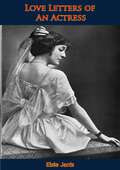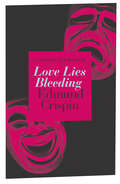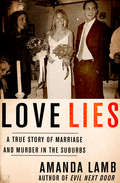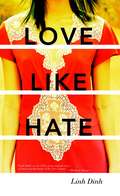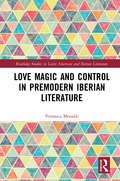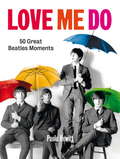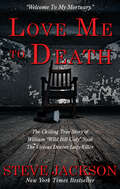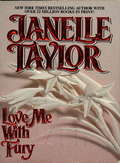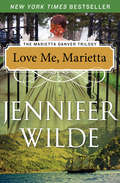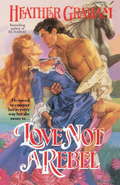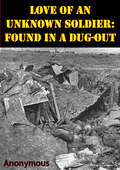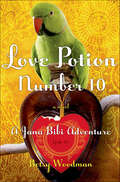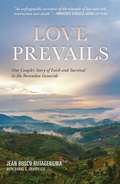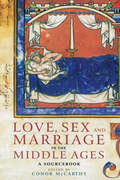- Table View
- List View
Love Letters of An Actress
by Elsie JanisThe fanciful, witty and amusing love scenes of and idealized actress of stage and screen at the turn of the twentieth century.“This little book is not in the least statistical, it is merely the legitimate off-spring of imagination and observation. Personally, the only man that ever told me he could not live without me was divorced by the lady he married two months afterwards, on the ground of cruelty. However, this is my idea of how a popular actress should be loved.”Elsie Janis (1889-1956), born Elsie Jane Bierbower to Jennie and John Bierbower in Columbus, Ohio, first entertained at the age of 2 ½ in various church activities at Dr. Washington Gladden’s First Congregational Church at the northwest corner of Broad and Third. Janis’s career in the performing arts was long and varied – from her childhood when she began doing imitations of celebrities in vaudeville, to her starring roles on the stages of New York, London, and Paris, to the battlefield where she entertained troops in France and England during World War I, to Hollywood where she acted, wrote for film, and supervised productions. From her teen years on, Janis wrote songs for herself and for others as well as a number of books, magazine articles, and poems. Janis’s mother Jennie was, until her death in 1930, Elsie’s constant companion and manager, and was known as one of show business’s most infamous stage mothers.
Love Lies Bleeding (The Gervase Fen Mysteries)
by Edmund CrispinFrom a British mystery author known as &“the master of the whodunnit,&” an amateur detective delights in solving murders at an English boys&’ school. Prof. Gervase Fen of Oxford University is honored to award the prizes at the Speech Day ceremonies at Castrevenford High School. As it turns out, the headmaster&’s selection of the part-time sleuth as a presenter is most fortuitous indeed. For the night before the big event, two of the school&’s staff members are murdered . . . Of course, Fen is happy to do some investigating, if only to get more fodder for the crime novel he&’s writing. Between the kidnapping, the student romances, and the accidental discovery of a long-lost Shakespearian manuscript, the eccentric Oxford don certainly gets some food for thought. But that&’s all in a day&’s work for an amateur detective with a penchant for literary allusions and an uncanny knack for solving the unsolvable. Praise for the mysteries of Edmund Crispin &“A marvellous comic sense.&” —P. D. James, New York Times–bestselling author of the Inspector Adam Dalgliesh series &“Master of fast-paced, tongue-in-cheek mystery novels, a blend of John Dickson Carr, Michael Innes, M.R. James, and the Marx Brothers.&” —Anthony Boucher, author of the Fergus O&’Breen series &“An absolute must for devotees of cultivated crime fiction.&” —Kirkus Reviews &“One of the most literate mystery writers of the twentieth century.&” —The Boston Globe &“Beneath a formidable exterior he had unsuspected depths of frivolity.&” —Philip Larkin, poet and author of A Girl in Winter &“One of the last exponents of the classical English detective story.&” —The Times (London)
Love Lies: A True Story of Marriage and Murder in the Suburbs
by Amanda LambA suburban housewife&’s picture-perfect life is shattered in this riveting true crime book from the author of Evil Next Door. When Nancy Cooper moved from Canada to Cary, North Carolina, with her new husband Brad, their future was bright. Living in one of the most picturesque towns in the United States, the couple mingled with neighbors, attended parties, and raised two daughters. Then, on July 14, 2008, the façade came crashing down when Nancy&’s strangled body was found in a storm pond. Nancy&’s husband claimed she had gone for a jog and never came back. But as the police investigation deepened, a complex web of affairs and lies involving multiple residents of Cary&’s idyllic neighborhoods was uncovered, and Brad was brought to trial for the murder of his wife. At the heart of it stood the Coopers&’ soured marriage, Nancy&’s threat to leave with the children, and her own cold-blooded murder. It would take a mountain of damning evidence before justice was served.
Love Like Hate: A Novel
by Linh DinhLinh Dinh is already one of the secret masters of short fiction. Love Like Hate is something like a traditional cross-cultural novel that's been shocked into life by Dinh's uncanny ability to tell us stories we didn't even know we wanted to hear. -- Ed Park, editor of The BelieverIn Love Like Hate, Linh Dinh weaves a dysfunctional family saga that doubles as a portrait of Vietnam in the last half century. Protagonists Kim Lan and Hoang Long marry in Saigon during the Vietnam War, uniting in a setting that allows Dinh's dark, deadpan humor to flourish. Describing his mushrooming cast of characters in unsentimental and sometimes absurd ways, Dinh embraces contradictions with the surreal exuberance of Matthew Sharpe and the stylistic élan of Italo Calvino.
Love Like the Movies
by Victoria Van TiemIn this irresistible romantic romp, movie fanatic Kensington Shaw is thrown into love--Hollywood-style--when her gorgeous ex presents a series of big screen challenges to win back her heart.What girl wouldn't want to experience the Pretty Woman shopping scene? It's number two on the list. Or, try the lift from Dirty Dancing? It's number five. One list, ten romantic movie moments, and a handful of shenanigans later, Kenzi has to wonder...should she marry the man her family loves, or risk everything for a love like the movies?
Love Magic and Control in Premodern Iberian Literature (Routledge Studies in Latin American and Iberian Literature)
by Veronica MenaldiThis book explores the complexity of Iberian identity and multicultural/multi-religious interactions in the Peninsula through the lens of spells, talismans, and imaginative fiction in medieval and early modern Iberia. Focusing particularly on love magic—which manipulates objects, celestial spheres, and demonic conjurings to facilitate sexual encounters—Menaldi examines how practitioners and victims of such magic as represented in major works produced in Castile. Magic, and love magic in particular, is an exchange of knowledge, a claim to power and a deviation from or subversion of the licit practices permitted by authoritative decrees. As such, magic serves as a metaphorical tool for understanding the complex relationships of the Christian with the non-Christian. In seeking to understand and incorporate hidden secrets that presumably reveal how one can manipulate their environment, occult knowledge became one of the funnels through which cultures and practices mixed and adapted throughout the centuries.
Love Me
by Rachel ShukertA new series set in the golden age of glam . . . Amanda is heartbroken. She's tried, but she can't get over her breakup with hotshot writer Harry Gordon. If only she could talk to him, she could convince him that their love story is bigger than any screenplay. But Amanda isn't the only one in Hollywood keeping a secret--Harry's got one too. Margo has to pinch herself: there's talk of her getting an Oscar nom for her first film role, and she's living with the Dane Forrest, the gorgeous movie star millions--including herself--swoon over. But if the public finds out about their domestic arrangement, her career will be over. The studio has a plan to fix it all . . . but is Margo prepared to pay the price?Gabby's drinking is out of control, but who cares? She's bored and depressed. She needs someone who will treat her like the woman she is beneath the silly stage costumes and pigtails. And she's sure unpredictable musician Eddie Sharp is The One. But playing with bad boys like Eddie isn't for little girls. . . ."In this scintillating sequel to Starstruck, the stakes are higher, the fights are cattier, and the drama soars sky-high . . . more twists and turns than Mulholland Drive. Secrets abound, and enough is held back to ensure that the next volume will have plenty left to reveal. This sizzling sequel definitely delivers the goods: think Valley of the Dolls meets Gossip Girl."--Kirkus ReviewsFrom the Hardcover edition.
Love Me Do
by Paolo HewittLove Me Do tells the story of the Beatles by highlighting and then examining in detail fifty significant events in their amazing career. Using huge amounts of research and personal insight, respected music journalist and author Paolo Hewitt will take the reader on a roller coaster ride, from the band's early days in Liverpool, their raucous behavior in Hamburg, their famous stint at The Cavern, onto the birth of Beatlemania and the incredible worldwide phenomenon that The Beatles became. The effect of worldwide fame on the band was highly significant. It forced them into the studio where they recorded classic albums such as Sgt Pepper and The Beatles. This book will look at their incredible music and their activities outside of that music. We will meet the Maharishi and go shopping with the band on the Kings Road. As the story unfolds we will witness how their ideals and their interests all served to influence their generation and many others. We will also take in the band's reformation in 1996 when Paul McCartney, George Harrison and Ringo Starr recorded and released two of John Lennon's songs. Here, then, are the 50 Great Beatles Moments.
Love Me Forever (Sherring Cross #2)
by Johanna LindseyStill mourning her mother's death, Kimberly Richards is incensed by the determination of her father , the Earl of Amburough, to marry her off as quickly as possible--just to please the jealous lover he plans to wed. And since Kimberly harbors a deep-seated dislike of gold-diggers and the whole distasteful state of affairs, the feisty young heiress already despises the worthy suitor she encounters at Sherring Cross Estate: Lachlan MacGregor, the dashing, newly impoverished Laird of Clan MacGregor. A tryst with the handsome, haughty Lachlan seems dubious at--especially since the rogue has designs on the married Duchess of Wrothston. But strange turns and outrageous circumstances promise to lead a woefully mismatched pair to a wildly unexpected destination--where a hard, resisting heart can open to the true glories of love.
Love Me To Death: The Chilling True Story of WIlliam “Wild Bill Cody” Neal—The Vicious Denver Lady-Killer
by Steve JacksonClassic true crime about one of the most monstrous serial killers in American history from the New York Times–bestselling author—now revised and updated. &“Here&’s What Happens When You Mess with Me!&” —William Neal William Neal, who called himself &“Wild Bill Cody,&” was seductive and skillful at separating love-struck women from their money, and ultimately, their lives. Apprehended by police, Neal, who proclaimed himself &“better than Ted Bundy,&” pleaded guilty to three murders then insisted on representing himself at his death penalty trial. But the psychopathic killer found himself up against the incredible courage of his one surviving victim. Recommended Reading by the True Crime Garage Podcast &“New York Times–bestselling author Steve Jackson examines Neal&’s horrific crimes and chronicles the dramatic efforts to bring the culprit to justice.&” —The Lineup, &“33 True Crime Books About the World&’s Most Notorious Serial Killers&”
Love Me Tonight
by Nan RyanHER CHALLENGE The war had robbed Helen Burke Courtney of her money and her husband. All she had left was her coastal Alabama farm, a broken-down plow horse, a cat, and her pride, but she meant to fight to hold on to them all against her creditors ... against fate itself. Captain Kurt Northway of the Union Army might be the answer to her prayers, or a way to get to hell a little faster. He rode up, his young son on the saddle before him, and asked for work. Helen needed a man's help to plant her crops; she didn't know if she could stand to have a damned, handsome Yankee do it. HER BELOVED Despite the past that made them enemies, Kurt was struggling to raise his son alone, not looking to take advantage of a woman or retaliate for the deep pain haunting his soul. So Helen took him in, though the entire town turned against her. He respected her; he didn't dare to touch her. Yet both felt the passion igniting between them, a fire that could destroy them both ... or a gift of healing, if they dared to risk their hearts.
Love Me Tonight
by Nan RyanAlone after the war, a Confederate widow takes in a destitute Union captainAs she breaks her back to plow her barren fields, Karen Courtney cannot help but glance at the road towards Mobile, hoping to see her beloved husband riding home. He has been gone for four years, and though she knows he must be dead, her broken heart refuses to give up hope. Finally, a man arrives, but not the sort for which she was looking. He is not Southern; he is not a gentleman. But Kurt Northway may prove to be just the man for whom she was waiting. A Yankee captain whose Southern wife died during the war, he has come to Alabama to retrieve his son. Friendless, broke, and far from the Mason-Dixon Line, he begs Karen for work for the sake of the boy, and she takes pity on the child. At Karen&’s shattered farm, love will take root—if her Confederate heart is not too proud to let it flourish.
Love Me With Fury
by Janelle TaylorPROMISE ME FOREVER...FOLLOW THE WIND...KISS OF THE NIGHT WIND...Janelle Taylor's lavish historical captivate and command with passionate tales of fiery love. And LOVE ME WITH FURY continues that bestselling tradition with the tale of the ravishing Alexandria and the dashing privateer who wins her desire and her love!LOVE MEWITHFURYWhen golden-haired Alexandria first saw the dark-haired stranger, her fury knew no bounds. How dare he intrude on her privacy as she swam in her secret pool! Though his caresses were tantalizing and his kisses intoxicating, Alexandria fought the sweet torment and struggles against her captor...until she could no longer resist the waves of delicious sensuality that left her longing for more. She had sworn to let no man have her, but against her will she gave herself to this ruthless pirate, a captive to his burning gaze and searing touch!
Love Me or Leave Me: A captivating saga of escapism and undying hope
by Josephine CoxWill her past ever leave her be? Love Me or Leave Me is a passionate and moving saga about a young woman who is ready to fight for a chance of happiness, from bestselling author Josephine Cox. Perfect for fans of Lyn Andrews and Cathy Sharp.'A lovely romance' - MirrorBeautiful Eva Bereton has just three close friends: Patsy, whom she looks upon as a sister; Bill, once her childhood sweetheart, now married and living in Canada; and her mother, to whom she is devoted. When a tragic accident turns Eva's world upside down, Patsy is the only one she can turn to.A hated figure from the past comes to reclaim the farm and business that Eva had always believed were her parents'. Not even Bill, still in love with Eva, can stop Eva being thrown out on the streets. Together with Patsy, Eva starts a new life far away.Luckily, they find work and lodgings wherever they settle. But when Eva arrives in Blackburn her past mistakes rise up to haunt her. Yet even when threatened from all sides Eva will never accept that her chances of happiness have been destroyed. Determined and optimistic, she fights on to change her life for the better.What readers are saying about Love Me or Leave Me: 'I couldn't put it down. The characters were amazing and the ending was true to life''What a lovely read. Heart-breaking at times but heart-warming at others. A must read''I started this lovely book and read it over two days, just couldn't put it down. A lovely story about friendship and love, and always having the strength to carry on'
Love Me or Leave Me: A captivating saga of escapism and undying hope
by Josephine CoxWill her past ever leave her be? Love Me or Leave Me is a passionate and moving saga about a young woman who is ready to fight for a chance of happiness, from bestselling author Josephine Cox. Perfect for fans of Lyn Andrews and Cathy Sharp.'A lovely romance' - MirrorBeautiful Eva Bereton has just three close friends: Patsy, whom she looks upon as a sister; Bill, once her childhood sweetheart, now married and living in Canada; and her mother, to whom she is devoted. When a tragic accident turns Eva's world upside down, Patsy is the only one she can turn to.A hated figure from the past comes to reclaim the farm and business that Eva had always believed were her parents'. Not even Bill, still in love with Eva, can stop Eva being thrown out on the streets. Together with Patsy, Eva starts a new life far away.Luckily, they find work and lodgings wherever they settle. But when Eva arrives in Blackburn her past mistakes rise up to haunt her. Yet even when threatened from all sides Eva will never accept that her chances of happiness have been destroyed. Determined and optimistic, she fights on to change her life for the better. What readers are saying about Love Me or Leave Me: 'I couldn't put it down. The characters were amazing and the ending was true to life''What a lovely read. Heart-breaking at times but heart-warming at others. A must read''I started this lovely book and read it over two days, just couldn't put it down. A lovely story about friendship and love, and always having the strength to carry on'
Love Me, Marietta: Love's Tender Fury; Love Me, Marietta; And When Love Commands (The Marietta Danver Trilogy #2)
by Jennifer WildeThe spellbinding New York Times–bestselling sequel to Love&’s Tender Fury follows Marietta Danver as she is captured by pirates in the Caribbean and caught once again between the desires of three very different, passionate men After surviving harrowing twists of fate, Marietta Danver has finally overcome her hardscrabble past. Soon she will be the wife of Lord Derek Hawke, the English aristocrat who fought for his legacy and is about to reclaim his beloved ancestral estate. But in New Orleans, Marietta meets rakish, indigo-eyed Jeremy Bond, who both attracts and intrigues her. Then, on the eve of her voyage back to England, Marietta once more becomes the prisoner of a cruel and capricious destiny. A shocking act of violence shatters her romantic dreams. A prisoner on the high seas, she&’s now at the mercy of the seductive and ruthless pirate Red Nick. It is here, on an island far from civilization, where she will again meet Jeremy Bond—a man who will risk his life over and over for the woman he loves. The Marietta Danver Trilogy also includes Love&’s Tender Fury and When Love Commands.
Love My Rifle More Than You: Young and Female in the U.S. Army
by Michael E. Staub Kayla Williams"A woman soldier has to toughen herself up," writes Kayla Williams in this fiercely honest account of what it's like to be part of the female 15 percent of today's Army. "Not just for the enemy, for battle, for death. I mean to toughen herself to spend months awash in a sea of nervy, hyped-up guys " Irreverent, vulnerable, angry, and humane, Williams describes what it's like for a young woman to be surrounded by an ocean of testosterone, respected for her skills and qualifications but treated variously as a soldier, a sister, a mother, a bitch, and a slut. During her five years of service -- including a year of deployment to Iraq during and after the invasionWilliams and her female peers navigate both extreme physical danger and emotional minefields. As a specialist in Military Intelligence, fluent in Arabic language skills, Williams finds herself at the forefront of the troops' interaction with local people. Brave and patriotic, with a strong sense of duty to her country and her fellow soldiers, +
Love Never Fails (The Homeward Journey #3)
by Martha RogersAt odds over their beliefs and separated by the war, Molly and Stefan must learn to depend of God. In book three of the Homeward Journey series, Daniel and Sally Delaney’s daughter Molly finishes school and returns to her home to teach. When old friends of her parents come for a visit with their son, Stefan, Molly is attracted to the young man, but all he is interested in is talking about his position in the army. When he leaves to rejoin his regiment, Molly is both relieved and saddened. Can they overcome their differences and find love?
Love Not a Rebel: North American Woman Trilogy #3) (The North American Woman Trilogy #3)
by Heather GrahamThe stunning North American Woman series concludes with this sexy tale of a revolutionary hero and the alluring Tory colonist who is forced to marry him. Red-hot desire burns in the two lovers who trust each other only as far as the bedroom.
Love Of An Unknown Soldier: Found In A Dug-Out [Illustrated Edition]
by AnonymousIncludes the First World War Illustrations Pack - 73 battle plans and diagrams and 198 photos'I think of you, as I shall think of you to the end, if the end comes. I do not want you less. I want you more perhaps, only not so selfishly. I realize that death does not finish all things. Love lives on. There are other worlds--there must be so many other worlds--in which I shall surely meet you if I miss you in this one. That I, so poor and human and puny, should be capable of this largeness of spirit, gives me confidence that God's scheme for us must be greater than we have guessed. He cannot be smaller than the souls He has created. You may not need me in this existence. We may have met too late to be much to each other. But I cannot think love is wasted.'The Love of an Unknown Soldier collects the intimate letters written by an anonymous World War I officer in Paris to his American love. Found by a young British soldier at the end of the war, the documents had been wedged in the wall of an abandoned gun dug-out, secreted away, and never mailed by the original author. There was no indication of the name or unit of the writer, presumed dead, nor did he mention the name of the girl he loved so dearly. Since tracing the letters' owner proved impossible, the young officer sent them to the publisher John Lane in an attempt to bring the letters to the attention of the American woman for whom the letters were written. The lady was never found, however, and the romantic soldier remains a mystery today.First published in 1916, this touching correspondence provides a clear depiction of the emotional realities and devastation of war.'- Print ed.
Love Potion Number 10 (Jana Bibi Adventures)
by Betsy WoodmanIn the newest Jana Bibi adventure from Betsy Woodman, Jana, Mr. Ganguly, and the gang are back as their small town in India is rocked by an espionage scandal and a homemade remedy that has love on everyone's mindThe Jolly Grant House still welcomes all its visitors with the sign Jana Bibi's Excellent Fortunes hanging proudly outside its front door. Jana's fortune-telling has brought a lot of attention to the small town of Hamara Nagar, and now that the dust has settled and the town is safe from the threat of being flooded by a government dam, all eyes are on the Scottish-born card-reader Jana and her feisty, loose-beaked parrot, Mr. Ganguly. Some people, though, are not to be trusted, and Mr. Ganguly finds himself the target of a potential kidnapping that puts Jana and her household on edge. Meanwhile, love is in the air and, thanks to Abenath's Apothecary, it's also in a bottle. Abenath has created an intoxicating brew that he calls Love Potion Number 10, which seems to have Jana in a tizzy. While she explores her newest hobby, dream interpretation, her head is swimming with questions: Is a new love possible at age fifty-nine? If so, would she ever marry again? All around her she sees different kinds of love and connection—family, arranged marriages, chemical attractions, even intercontinental romance between people who have only met through letters—so when an old flame arrives and rekindles long-gone feelings, Jana begins to think that Love Potion Number 10 just might be the magic elixir its inventor thinks it is.
Love Prevails: One Couple's Story of Faith and Survival in the Rwandan Genocide
by Jean Bosco RutagengwaTwenty-five years ago in April 1994, a savage campaign of genocide was unleashed against the Tutsis of Rwanda. In the space of one hundred days, one million people were left dead. This personal narrative tells the story of two survivors--Jean Bosco and his fiancée Christine. While most of their family members perished, they found refuge in what later become famous as the “Hotel Rwanda.” Their story of survival is at once a love story and a harrowing inside look at what happens when a country is overrun by evil. But it is also a story of faith--an effort to find God in the midst of horror--and of the subsequent struggle to find meaning, healing, and reconciliation.
Love Reunited (Claremont)
by Renee AndrewsEight years ago, Landon Cutter dared to tell his childhood sweetheart that he loved her-days before her wedding to another man. But Georgiana Sanders sent him away forever. Now, the former soldier returns to their Alabama ranching town and discovers that Georgiana is a single mother-and lost her sight in a long-ago accident he believes he caused. Landon has never stopped loving the sweet country gal, but Georgiana thinks he's just trying to make amends. Now he'll need the help of a community-and one special little girl-to heal old hurts...and bind two hearts.
Love Rock Revolution: K Records and the Rise of Independent Music
by Mark BaumgartenPunk isn't a sound--it's an idea! In 1982, K Records released its first cassette and put its own spin on punk's defiant manifesto: You don't need anyone's permission to make music. Thirty years later, the label continues to operate in the underground while rightfully claiming a role as one of the most transformative engines of modern independent music. In its history, K Records has fostered some of independent music's greatest artists, including Beat Happening, Built to Spill, Beck, Modest Mouse, and the Gossip. It has also galvanized the international pop underground, helped create the grunge scene that took over pop culture, and provided a launching pad for the riot grrrl movement that changed the role of women in music forever. Love Rock Revolutiontells the story of how it all happened, recounting the early journeys of K Records founder Calvin Johnson from the punk mecca of London to the hardcore clubs of Washington, D. C. , in the late-'70s, the creation of K Records in the '80s, the label's role in revolutionizing independent music in the '90s, and its struggle to survive that revolution with its integrity intact.
Love Sex & Marriage in the Middle Ages: A Sourcebook
by Conor McCarthyFirst published in 2004. Routledge is an imprint of Taylor & Francis, an informa company.
